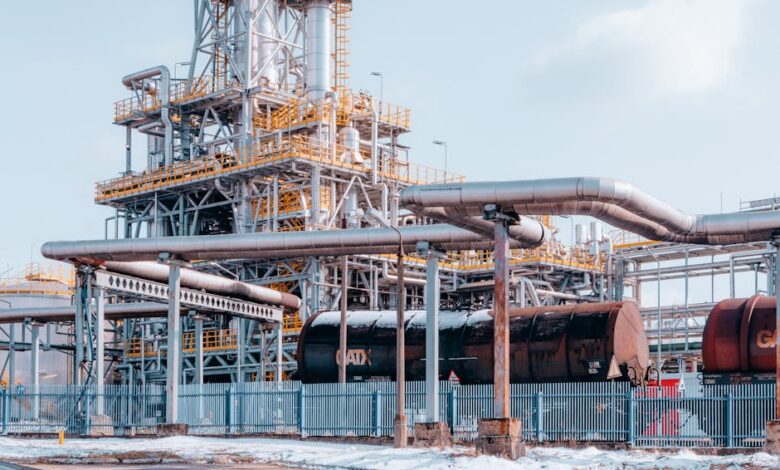Mastering the Oil Supply Chains: Unraveling the Logistics of Crude Oil Production, Refining, and Delivery in Today’s Global Market

**Understanding the Intricacies of Oil Supply Chains: The Backbone of Global Energy**
In an era where energy security and environmental concerns are at the forefront of global discussions, the logistics of oil production, refining, and delivery remain critical to both national economies and international relations. The oil supply chain is a complex web that begins with crude oil extraction and extends through refining, storage, and transportation, ultimately reaching consumers and industries worldwide. As we navigate the intricate dynamics of this vital sector, we encounter key players like OPEC, whose decisions can significantly influence oil prices and market trends, alongside emerging factors such as shale oil and offshore drilling that reshape the landscape of oil exploration.
This article aims to unravel the multifaceted processes that define the oil supply chain, with a focus on the refining sector and its substantial impact on oil market trends and environmental considerations. We will delve into the essential role of oil transportation and storage in ensuring a seamless global oil trade, especially in a climate where compliance with regulations and the development of alternative energy sources like biofuels and natural gas are increasingly prioritized. Join us as we explore the intricate logistics that drive one of the world’s most critical industries, revealing not only the operational challenges but also the geopolitical implications and future prospects of oil consumption and investment.
- 1. **"Navigating the Global Oil Supply Chains: From Crude Oil Production to Delivery"**
- *(Exploring the logistics and processes involved in oil production, refining, and transportation, while highlighting key players like OPEC and the impact of shale oil and offshore drilling.)*
- 2. **"The Dynamics of Oil Refining and Its Role in Shaping Oil Market Trends"**
1. **"Navigating the Global Oil Supply Chains: From Crude Oil Production to Delivery"**
Navigating the Global Oil Supply Chains: From Crude Oil Production to Delivery
The global oil supply chain is a complex network that plays a vital role in the world economy and energy security. It encompasses various stages, beginning with crude oil production and extending through refining, transportation, and ultimately, delivery to consumers. Understanding this intricate process is essential for those involved in oil investing, regulatory compliance, and energy policy.
**Crude Oil Production**
The journey of oil begins at oil fields, where crude oil is extracted through methods such as offshore drilling and shale oil extraction. Countries rich in oil reserves, especially members of OPEC (Organization of the Petroleum Exporting Countries), are pivotal in maintaining the balance of oil prices and ensuring a steady flow of crude oil into the global market. As oil market trends fluctuate, these countries often adjust their production levels to stabilize prices, directly impacting oil consumption and investment decisions worldwide.
**Oil Refining and Petrochemicals**
Once extracted, crude oil undergoes refining, a process that transforms it into usable products such as gasoline, diesel, and petrochemicals. The downstream oil sector focuses on these processes, where the environmental impact of oil refining is a growing concern. Advances in oil technologies are being implemented to minimize emissions and improve efficiency, contributing to sustainable practices in oil production.
**Oil Transportation and Storage**
Transportation of refined products is crucial in the oil supply chain. Oil pipelines, tankers, and rail systems facilitate the movement of oil across continents, connecting production sites to refineries and distribution centers. Efficient oil storage solutions are necessary to manage supply and demand fluctuations, particularly during geopolitical tensions that may impact oil prices and energy security.
**Emerging Trends and Alternatives**
As the global landscape shifts, alternative energy sources such as biofuels and natural gas are gaining traction, influencing the dynamics of oil consumption and investing. The rise of oil alternatives poses both challenges and opportunities within the oil supply chains, prompting a reevaluation of strategies by industry stakeholders.
**Conclusion**
Navigating the global oil supply chains requires a comprehensive understanding of the interconnected processes from crude oil production to delivery. As the industry adapts to evolving market trends, regulatory frameworks, and environmental considerations, stakeholders must stay informed to ensure compliance and optimize their investment strategies effectively. The future of oil is not only about securing energy but also about balancing economic growth with environmental stewardship.
By grasping the complexities of oil supply chains, investors and policymakers can better prepare for the ongoing shifts in the oil landscape, ensuring sustained energy security and competitive advantage in an ever-changing market.
*(Exploring the logistics and processes involved in oil production, refining, and transportation, while highlighting key players like OPEC and the impact of shale oil and offshore drilling.)*
The logistics of oil supply chains encompass a complex web of processes that begin with oil exploration and extraction, continue through refining and transportation, and culminate in the distribution of refined products to consumers. Understanding these processes is essential for grasping the dynamics of the oil market, particularly in light of key players such as OPEC and the growing influence of shale oil and offshore drilling.
Oil production starts with exploration, where companies utilize advanced technologies to locate oil reserves. Once a viable oil field is identified, extraction begins, often requiring significant investment in oil field services and compliance with various regulations. The crude oil extracted is then transported to refineries, which play a crucial role in the downstream oil supply chain. Oil refining processes convert crude oil into usable products, including gasoline, diesel, and petrochemicals, impacting oil prices and market trends.
OPEC (Organization of the Petroleum Exporting Countries) serves as a major player in the global oil trade, influencing oil market trends and prices through its production quotas. The organization's decisions can significantly affect energy security and oil price volatility, highlighting the geopolitical aspects of oil consumption and production. Meanwhile, the rise of shale oil production in the United States has reshaped the landscape, allowing for increased domestic oil supply and altering traditional supply chains.
Offshore drilling has also emerged as a significant contributor to global oil reserves, with deep-water drilling technologies pushing the boundaries of oil exploration. However, this comes with environmental implications, as the extraction process poses risks to marine ecosystems. The industry is now facing pressure to explore oil alternatives and biofuels, seeking to mitigate the environmental impact of oil while ensuring energy security.
Transportation of crude oil and refined products is another critical aspect of the supply chain. Oil pipelines, tankers, and storage facilities are vital for maintaining a steady flow from production sites to end-users. The logistics involved in oil transportation must navigate regulatory frameworks and market demands, which can influence oil price hedging strategies for investors.
In summary, the logistics of oil production, refining, and transportation are intricately linked to major players like OPEC and evolving technologies in shale oil and offshore drilling. Understanding these dynamics not only sheds light on oil supply chains but also highlights the ongoing challenges and opportunities in the global oil market, including the need for sustainable practices and compliance with environmental regulations.
2. **"The Dynamics of Oil Refining and Its Role in Shaping Oil Market Trends"**
The oil refining process is a crucial component of the global oil supply chain, significantly influencing oil market trends and prices. Once crude oil is extracted through various methods such as offshore drilling or shale oil production, it must undergo refining to convert it into usable products like gasoline, diesel, and petrochemicals. This downstream oil sector not only ensures that crude oil is transformed into market-ready products but also plays a pivotal role in shaping energy security and oil consumption patterns worldwide.
Refining capacity is concentrated in specific regions, often affecting the dynamics of the global oil trade. For instance, countries with substantial oil reserves, such as those in OPEC, maintain strategic refineries that can adapt to fluctuations in oil prices. These refiners process crude oil into various products, which can be stored and transported through an extensive network of oil pipelines and tankers. The ability to manage oil storage effectively allows refiners to respond to market changes, thus impacting oil price hedging strategies for investors.
Moreover, the refining process is increasingly scrutinized for its environmental impact. As concerns about climate change rise, there is a growing shift towards oil alternatives, including biofuels and other renewable energy sources. This trend is shaping the future of the oil industry, pushing companies to innovate and adopt new oil technologies that reduce emissions and improve efficiency in oil production and refining.
Additionally, oil geopolitics play a significant role in refining dynamics. Political instability in oil-rich regions can disrupt supply chains, leading to spikes in oil prices and a reevaluation of energy policies across the globe. Countries are now investing in oil field services and regulatory compliance to ensure their refining operations remain resilient amid these challenges.
In conclusion, the oil refining sector is not just a step in the production process, but a dynamic player in the energy market. Its influence on oil prices, consumption trends, and environmental considerations underscores the complexity of oil supply chains and the ongoing evolution of the energy landscape. By understanding these dynamics, stakeholders can better navigate the intricate world of oil investing and the broader implications for global energy security.
In conclusion, understanding the intricacies of oil supply chains is essential for grasping the broader dynamics of the global oil market. From the initial stages of crude oil production, influenced by geopolitical factors and OPEC's strategic decisions, to the complex processes of oil refining and transportation, every step plays a crucial role in determining oil prices and market trends. As we navigate an evolving landscape marked by the rise of shale oil, offshore drilling, and advancements in oil technologies, it becomes increasingly clear that oil supply chains are not only vital for energy security but also for shaping the future of oil investing and the potential for alternative energy sources.
The interplay between oil consumption, storage, and the downstream oil sector continues to affect oil geopolitics and compliance with regulations worldwide. As we look ahead, the environmental impact of oil, coupled with the growth of biofuels and other oil alternatives, will challenge traditional supply models and necessitate innovative strategies in oil price hedging and exploration. By recognizing these complexities, stakeholders can better position themselves within the global oil trade and make informed decisions that reflect both market realities and environmental considerations.
As we move toward a more sustainable energy future, understanding the logistics of oil supply chains will remain critical for industry professionals, policymakers, and investors alike. Embracing this knowledge will not only enhance our grasp of current market conditions but also prepare us for the transformative changes that lie ahead in the energy sector.
—
This conclusion integrates the relevant SEO keywords while summarizing the key points discussed in the article. It emphasizes the significance of understanding oil supply chains in the context of current trends and future developments in the oil industry.





